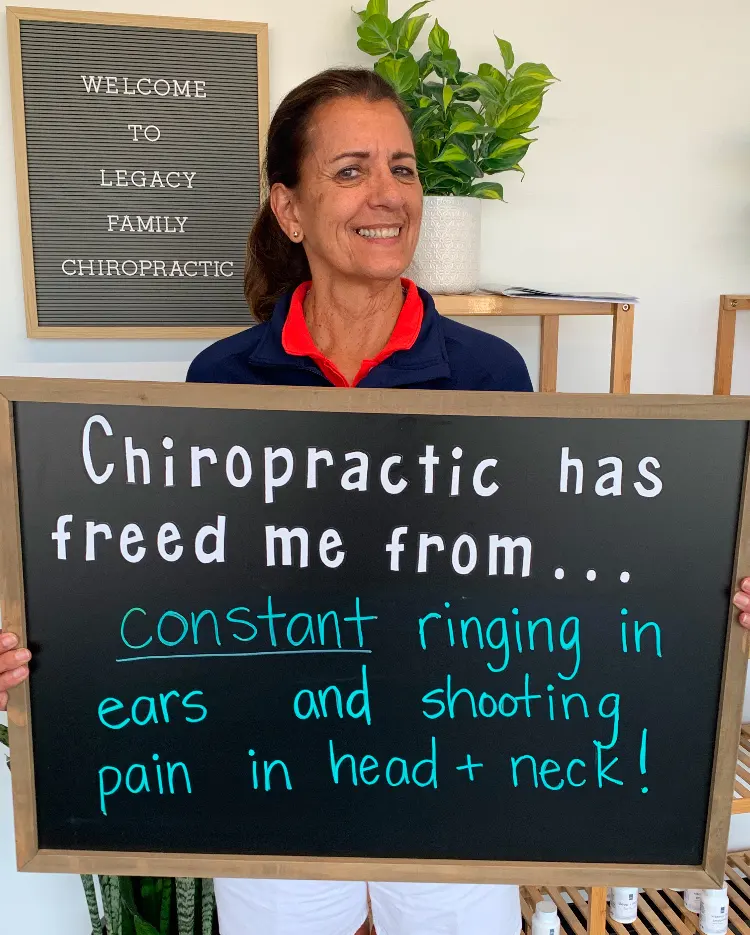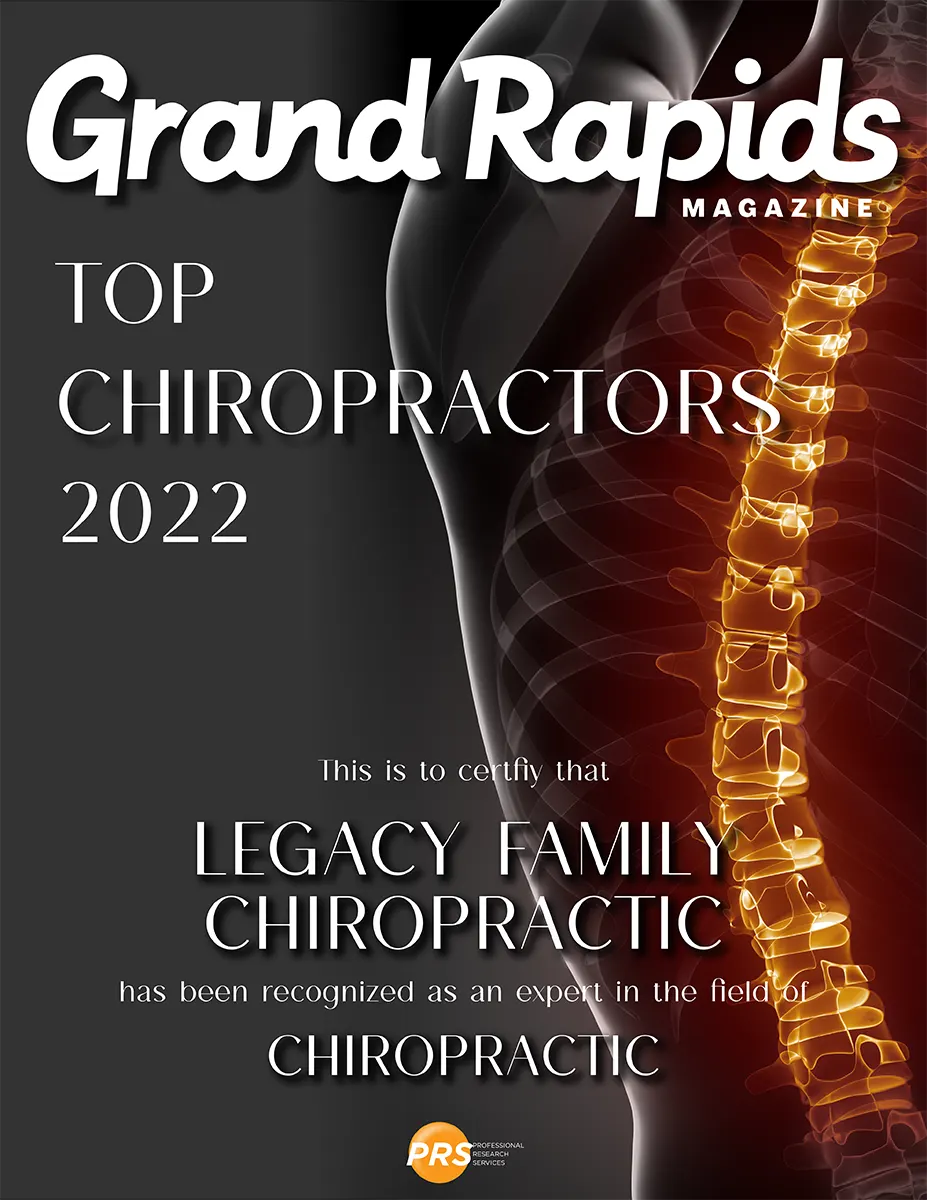
Reverse Your Nerve Pain
FDA-Approved Neuropathy Relief: Zero Medication Required
Neuropathy is a common neurological disorder affecting the peripheral and central nervous systems. At Legacy Chiropractic, we commonly see people suffering from symptoms such as numbness, tingling, or weakness in the hands or feet; pain or cramping in the muscles; loss of sensation in the extremities; and problems with balance and coordination.
Dr. Steph has helped hundreds of people in the Comstock and Grand Rapids area overcome neuropathy pain WITHOUT costly medication or surgery. Schedule an initial $49 consultation to see how our center can help you feel amazing, get back to living, and be the best version of you.
How Our Neuropathy Care Plan Works
Stop masking the symptoms and get to the root cause of the neuropathy
1. Be Truly Heard
And Understood
Far too many people have told us that they felt like their doctor was not listening, and rushed off after filling yet another prescription, ignoring the true cause of their issue. Let’s change that so you can finally be heard.
2. Take The First Step
Towards Healing
“We don’t guess…we test.” The first step is finding the cause of the neuropathy. Our state-of-the-art facility allows us to gather the evidence to support the diagnoses and clinical decisions that help you get better, faster.
3. Be More.
Do More.
We create a customized care plan based on five key areas of health to address the root cause of your neuropathy getting you back to the best version of YOU, faster. Get healthy, stay healthy. Be more, do more. That’s what TRUE healthcare looks like.
Patient Testimonials


How We Treat Neuropathy
Neuropathy can be caused by many things, from diabetes to traumatic injuries. Unfortunately, the condition is often overlooked by physicians and patients alike. Below are some approaches we use to care for neuropathy.
Comprehensive Consultation and Exam
At our center, we take a comprehensive approach to treating neuropathy. We start with a consultation to get to the root of the problem. Then, we perform a thorough exam to rule out any other potential causes of the symptoms. After that, we develop a personalized treatment plan that may include chiropractic adjustments, physical therapy, electrical stimulation, suggested supplementation, and lifestyle changes. We also offer support and resources to assist our patients in managing their conditions and enhancing their quality of life.
Chiropractic Care
Chiropractic care is a drug-free, non-invasive treatment option for neuritis that focuses on restoring normal function to the nervous system. By aligning the spine and correcting subluxations, chiropractors can take pressure off the nerves and allow them to heal.
Chiropractic care effectively reduces pain, improves nerve function, and increases range of motion. It is a practical and safe treatment for neuritis that can help you get back to living your life.
Decompression Therapy
Spinal decompression is a non-surgical treatment that gently stretches the spine to relieve nerve pressure. It can help reduce pain, improve blood flow, and promote oxygen delivery to the affected areas. If you’re looking for a safe and effective treatment for neuritis, this therapy may be right for you.
Nutrition/Supplementation
A critical aspect of treatment is nutrition and supplementation. A healthy diet is vital for everyone, but it is essential for those with neuritis. Certain nutrients can help to support nerve health and reduce inflammation. These include omega-3 fatty acids, B vitamins, vitamin D, and magnesium.
Types of Neuropathy
There are different types of mononeuropathy, including peripheral mononeuropathy, autonomic neuropathy, focal mononeuropathy, and others.
Peripheral Neuropathy
Peripheral mononeuropathy is nerve damage resulting from diabetes, certain medications, infections, traumatic injuries, and exposure to toxins. Symptoms may include numbness, tingling, pain, and weakness.
Diabetic mononeuropathy is the most popular type of peripheral mononeuropathy. It typically affects the feet and legs first and can eventually spread to the hands and arms. Diabetic mononeuropathy is brought up by high blood sugar levels damaging the nerves.
Medication-induced mononeuropathy can be caused by chemotherapy drugs used to treat cancer or HIV/AIDS. Antidepressants, heart medications, and over-the-counter drugs have also been linked to peripheral mononeuropathy.
Infections such as shingles or hepatitis C can lead to nerve damage. Traumatic injuries, including those from car accidents or falls, can also cause peripheral mononeuropathy. Besides, exposure to toxins such as lead or mercury can damage the nerves and cause peripheral mononeuropathy.
Proximal Neuropathy
Proximal neuropathy, also known as lumbosacral plexus mononeuropathy, is a type of peripheral nerve damage that occurs when the lumbosacral plexus, a network of nerves in the lower back and pelvis, is damaged. This mononeuropathy can cause weakness and pain in the legs and hips. Proximal mononeuropathy is most often caused by diabetes, but certain infections, injuries, or tumors can also cause it. Treatment for proximal mononeuropathy typically relieves pain and improves strength and function.
Autonomic Neuropathy
Autonomic mononeuropathy is a kind of mononeuropathy that affects the autonomic nervous system. The autonomic nervous system controls involuntary body actions, like blood pressure, heart rate, digestion, and sweating. Autonomic mononeuropathy can occur in any part of the autonomic nervous system.
Symptoms of autonomic neuropathy depend on which organ or body system is affected. If blood pressure control is affected, symptoms may include lightheadedness or fainting when standing up too quickly. If the digestive system is affected, symptoms may include nausea, vomiting, diarrhea, or constipation. Other possible symptoms include trouble urinating (urinary incontinence), sexual dysfunction, and problems with sweating.
Other conditions, such as diabetes or certain infections, usually cause autonomic mononeuropathy. It can also be caused by certain medications or surgery.
Treatment for autonomic mononeuropathy focuses on managing the underlying condition and relieving symptoms. For example, if diabetes is the cause, treatment will focus on controlling blood sugar levels.
Patient Testimonials
Voted Top Chiropractor By Grand Rapids Magazine

2020

2021

2022
Frequently Asked Questions
Neuropathy is often called a “silent epidemic” because its symptoms are often misdiagnosed or overlooked. If you or a loved one you know is living with mononeuropathy, it’s essential to understand how to manage your symptoms and get relief. This section will help you know what you can do to help yourself or a loved one. Some frequently asked questions on neuropathy include:
Can a chiropractor help with neuropathy?
Neuropathy is a general term for various conditions involving damage to the nervous system. This can include the brain, spinal cord, and the nerves that connect them. Injuries, infections, or diseases can cause mononeuropathy. It can also be inherited or caused by certain medications or toxins.
Chiropractic care is a form of optional medicine that focuses on diagnosing and treating mechanical disorders of the musculoskeletal system, especially the spine. Chiropractors use manual therapy, including manipulation of the spine, joints, and soft tissues, and ergonomic and nutritional counseling.
Can a chiropractor help with numbness in the feet?
The response to this question is yes; a chiropractor can help with numb feet. Chiropractic care is a holistic approach to health care that focuses on the body’s ability to heal. When the body is in alignment, the nervous system functions properly, and the body can heal itself.
Chiropractors use various techniques to align the spine and improve nerve function. These techniques include spinal manipulation, massage, and stretching. Chiropractic care is safe and effective for many people. It can be used to treat a wide variety of conditions, including numbness in the feet.
What are the warning signs of neuropathy?
There are a few warning signs that may indicate you have mononeuropathy. These include:
- Numbness in your hands or feet
- A feeling of being unable to move your arms or legs
- Sharp, shooting pains in your extremities
- Muscle weakness
- Loss of balance or coordination
What is the main cause of neuropathy?
There are many possible neuropathy causes, but the most common cause is nerve damage. This can be caused by physical injury, infection, or exposure to certain toxins or chemicals. It can also be caused by diabetes or other diseases that affect the nervous system.
Does neuropathy go away?
Neuropathy is a condition that impacts the nerves, and it can cause pain, numbness, and weakness. It is important to note that neuropathy is not curable, but it is possible to manage the symptoms and enhance the standard of life with treatment options such as chiropractic care.
How do you stop neuropathy from progressing?
The most critical thing you can do to stop mononeuropathy from progressing is to see your chiropractor. Many treatments available can help slow the progression of neuropathy and improve your quality of life.

Check Out Our Location Near You
4064 Alpine Ave NW STE B, Comstock Park, MI 49321











